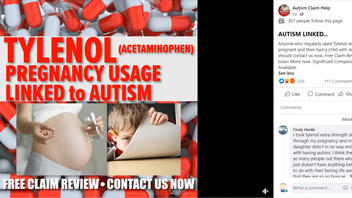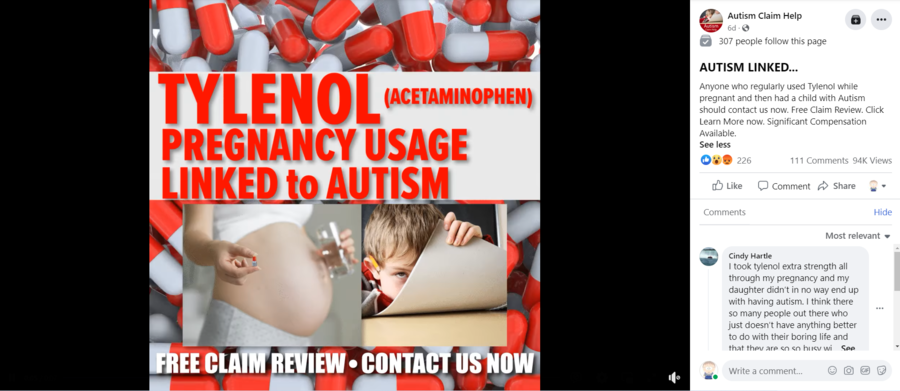
Is Tylenol use during pregnancy linked to autism? No, there's no evidence to support that. Autism or autism spectrum disorder (ASD - archived here) is a complex developmental disability caused by differences in the brain. According to the Centers for Disease Control and Prevention (CDC - archived here), little is known about its specific causes. Diagnosing ASD can be difficult since there is no medical test.
The claim appeared in a Facebook post (archived here) on July 7, 2022, under the title "AUTISM LINKED..." It opens:
Anyone who regularly used Tylenol while pregnant and then had a child with Autism should contact us now. Free Claim Review. Click Learn More now. Significant Compensation Available.
This is what the post looked like on Facebook at the time of writing:
(Source: Facebook screenshot taken on Thu Jul 14 14:45:40 2022 UTC)
Lawsuits
As of June 10, 2022, at least 19 lawsuits had been filed in U.S. district courts nationwide alleging a connection between acetaminophen, the active ingredient in Tylenol, and two conditions -- ASD and attention-deficit/hyperactivity disorder (ADHD). Each raises similar claims that pharmacies and drug manufacturers failed to warn about the risks associated with prenatal exposure to it. Also, many law firms, like the one in the post above, are soliciting clients online for lawsuit claim reviews.
More diagnoses
The prevalence of autism has grown considerably in less than two decades, from about 1 in 150 children in 2000 to about 1 in 44 in 2018, according to estimates from CDC's Autism and Developmental Disabilities Monitoring Network (archived here).
In a July 14, 2022, email to Lead Stories, the CDC said multiple things appear to cause ASD. Acetaminophen was not on their list:
There are many different factors that have been identified that may make a child more likely to have ASD, including environmental, biologic, and genetic factors.
Although we know little about specific causes, the available evidence suggests that the following may put children at greater risk for developing ASD:
- Having a sibling with ASD
- Having certain genetic or chromosomal conditions, such as fragile X syndrome or tuberous sclerosis
- Experiencing complications at birth
- Being born to older parents
The studies
A 2019 study funded by the National Institutes of Health suggested a link between acetaminophen exposure in pregnancy and a higher risk of autism and ADHD. A 2018 study published in the American Journal of Epidemiology did as well. Separately, a 2021 "Consensus Statement" by 91 scientists, clinicians and public health professionals expressed their concerns about pregnant women using the drug.
In a July 14, 2022, email to Lead Stories, the Food and Drug Administration said such studies left its experts unconvinced:
The FDA is aware of and understands the concerns arising from reports questioning the safety of prescription and over-the-counter (OTC) pain medicines when used during pregnancy. As a result, we evaluated research studies on acetaminophen published in the medical literature and determined that they are too limited to make any recommendations based on these studies at this time. Because of this uncertainty, the use of pain medicines during pregnancy should be carefully considered. We urge pregnant persons to always discuss all medicines with their health care professionals before using them.
Dr. Ann Anderson Berry, a neonatologist at the University of Nebraska Medical Center, concurs with the FDA. In a July 14, 2022, phone interview, she said:
Studies should not be taken as conclusive. ... We have to look at it in a much more systematic way. ... I think it is entirely premature to associate Tylenol use with ASD.
And the American College of Obstetricians and Gynecologists issued a response to the Consensus Statement, saying it did not provide any "clear evidence that proves a direct relationship between the prudent use of acetaminophen during any trimester and fetal developmental issues" and that "patients should not be frightened away from the many benefits of acetaminophen."
The manufacturer
The Tylenol brand of acetaminophen is made by Johnson & Johnson. In a July 14, 2022, email to Lead Stories, the company said:
The health and safety of the people who use our products is our top priority and we always recommend consumers carefully read and follow the label when using any over-the-counter medication. The label on our adult TYLENOL® products, in which acetaminophen is the active ingredient, states, 'If pregnant or breast-feeding, ask a health professional before use.' We will always evaluate new data. At this time, we are not aware of any evidence that supports a causal link between acetaminophen use during pregnancy and the risk of adverse fetal outcomes.

















